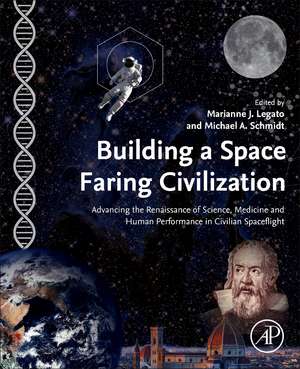Building a Space-Faring Civilization: Advancing the Renaissance of Science, Medicine and Human Performance in Civilian Spaceflight
Editat de Michael Schmidt A, Marianne Legato Jen Limba Engleză Paperback – 29 ian 2025
This book gathers some of the most accomplished thought leaders in the field of human spaceflight today. Collectively, they helped build the international space station (ISS), develop the field of orbital medicine, guide the development of commercial orbital platforms, plan missions to the Moon and Mars, and forge the innovation necessary for the commercial spaceflight industry to thrive today. The result is an exceptional source of wisdom, experience, and insight surrounding the current biomedical, technical, industrial, legal, and social implications of what is emerging as a true renaissance period in human history.
- Describes the lessons learned from past explorers from the Renaissance to the present, and how they can guide space exploration today
- Characterizes the risks encountered in the exploration and settlement of different domains of space
- Surveys the types of medical incidents civilian space travelers are likely to encounter, based on professional astronaut reports
- Summarizes the types of biomedical assessment civilian space travelers will require in order to ready themselves for the dangers of space
- Explores the types of preparation, training, and medical countermeasures needed to live and work in space
Preț: 732.72 lei
Preț vechi: 960.23 lei
-24% Nou
Puncte Express: 1099
Preț estimativ în valută:
140.22€ • 146.21$ • 116.54£
140.22€ • 146.21$ • 116.54£
Carte tipărită la comandă
Livrare economică 14-28 martie
Preluare comenzi: 021 569.72.76
Specificații
ISBN-13: 9780443138508
ISBN-10: 0443138508
Pagini: 392
Dimensiuni: 216 x 276 mm
Greutate: 0.45 kg
Editura: ELSEVIER SCIENCE
ISBN-10: 0443138508
Pagini: 392
Dimensiuni: 216 x 276 mm
Greutate: 0.45 kg
Editura: ELSEVIER SCIENCE
Cuprins
1. Space: relaunching Icarus
2. Civilian spaceflight: inspiration from the arts of the Italian Renaissance
3. Space—and the third great age of discovery
4. What do we think about when we think about settling space? An inclusive perspective
5. Galileo and space colonization
6. Vast is not infinite: challenges to governance and justice due to concentrated and finite space resources
7. The frontier of mining space resources and preparing human explorers and workers for those operations
8. What the first commercial space station means for humanity
9. The human experience of conducting engineering and construction operations in space
10. Humanity in the orbital age
11. Space architecture and the four futures of human space flight
12. Insights into spaceflight team performance gleaned from the exploration of challenging environments on Earth
13. Human Systems Integration: insights from exploring the sky and space: mitigation strategies for future space operations
14. Risk and systems knowledge in human spaceflight
15. Preparing for the unpredictable: facilitating multisystem resilience in human spaceflight
16. Twin studies, biobanks, and genome engineering to enable long-duration spaceflight
17. Using functionally characterized networks in the application of precision medicine in spaceflight
18. The Astronaut Digital Twin: accelerating discovery and countermeasure development in the optimization of human space exploration
19. Lessons learned—Part I: Medical screening, standards, and in-flight medical incidents, events, or risks
20. Lessons learned part II: in-flight medical equipment, capabilities, and countermeasures; and new medical paradigms for the future flights to low earth orbit and beyond!
21. Harnessing neuroplasticity’s features for civilian spaceflight through remediation and treatment
22. The critical imperatives of behavioral resilience in civilian space flight travelers
23. The human research program for civilian spaceflight
24. Biotechnology for a spacefaring civilization—necessary and challenging
25. Foundations of a Space Bill of Rights
2. Civilian spaceflight: inspiration from the arts of the Italian Renaissance
3. Space—and the third great age of discovery
4. What do we think about when we think about settling space? An inclusive perspective
5. Galileo and space colonization
6. Vast is not infinite: challenges to governance and justice due to concentrated and finite space resources
7. The frontier of mining space resources and preparing human explorers and workers for those operations
8. What the first commercial space station means for humanity
9. The human experience of conducting engineering and construction operations in space
10. Humanity in the orbital age
11. Space architecture and the four futures of human space flight
12. Insights into spaceflight team performance gleaned from the exploration of challenging environments on Earth
13. Human Systems Integration: insights from exploring the sky and space: mitigation strategies for future space operations
14. Risk and systems knowledge in human spaceflight
15. Preparing for the unpredictable: facilitating multisystem resilience in human spaceflight
16. Twin studies, biobanks, and genome engineering to enable long-duration spaceflight
17. Using functionally characterized networks in the application of precision medicine in spaceflight
18. The Astronaut Digital Twin: accelerating discovery and countermeasure development in the optimization of human space exploration
19. Lessons learned—Part I: Medical screening, standards, and in-flight medical incidents, events, or risks
20. Lessons learned part II: in-flight medical equipment, capabilities, and countermeasures; and new medical paradigms for the future flights to low earth orbit and beyond!
21. Harnessing neuroplasticity’s features for civilian spaceflight through remediation and treatment
22. The critical imperatives of behavioral resilience in civilian space flight travelers
23. The human research program for civilian spaceflight
24. Biotechnology for a spacefaring civilization—necessary and challenging
25. Foundations of a Space Bill of Rights
